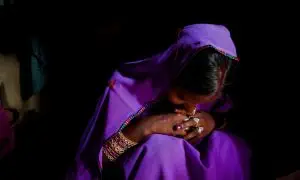 Study indicates the trend is based on early marriage – one-fifth of Indian women still marry before the age of 15 – along with male violence against women and other symptoms of a deeply entrenched patriarchal culture.
Study indicates the trend is based on early marriage – one-fifth of Indian women still marry before the age of 15 – along with male violence against women and other symptoms of a deeply entrenched patriarchal culture.
Suicide was also the leading cause of death for young people of both genders but was worse for women.
The study noted that suicide had recently been decriminalised, so there was a possibility the true rate could be even higher but hidden by families and doctors for fear of stigma or police interference.
Nearly two in every five women in the world who kill themselves are Indian, according to a Lancet study published this week that says the country’s suicides rates constitute a public health crisis.
The rate of Indian women who die by suicide has fallen since 1990, but not as fast as elsewhere in the world, and now represents 36.6% of global female suicide deaths, the report in the UK medical journal found.
Indian women who died by suicide were more likely to be married, to be from more developed states and, by a large margin, aged below 35.
“It shows girls in India are in serious trouble,” said Poonam Muttreja, the executive director of the Population Foundation of India, a public health group.
She and other specialists blamed the trend on early marriage – one-fifth of Indian women still marry before the age of 15 – along with male violence against women and other symptoms of a deeply entrenched patriarchal culture.
The suicide rate among Indian women was three times higher than what might be predicted for a country with similar geography and socio-economic indicators, the researchers said.
“Our social norms are very regressive,” Muttreja said. “In the village, a girl is called her father’s daughter, then she is her husband’s wife, and when she has a son, she is her son’s mother.”
Muttreja said research carried out by her organisation had shown that 62% of surveyed women believed it was legitimate for their husbands to beat them.
The researchers speculated the link between suicide and marriage was due to the burdens of youth motherhood, the low social status afforded to wives in some households, the lack of financial independence and exposure to domestic violence.
“The disproportionately high suicide deaths in India are a public health crisis,” the authors, who are mostly affiliated with Indian public health research groups, said.
Around one in four men in the world who die by suicide are Indian, roughly the same proportion as in 1990, the study said.
Suicide was also the leading cause of death for young people of both genders but was worse for women.
The study noted that suicide had recently been decriminalised, so there was a possibility the true rate could be even higher but hidden by families and doctors for fear of stigma or police interference.
Leave a Reply